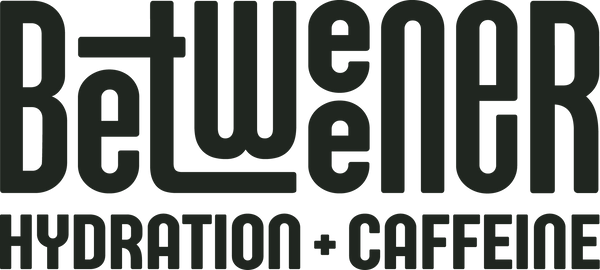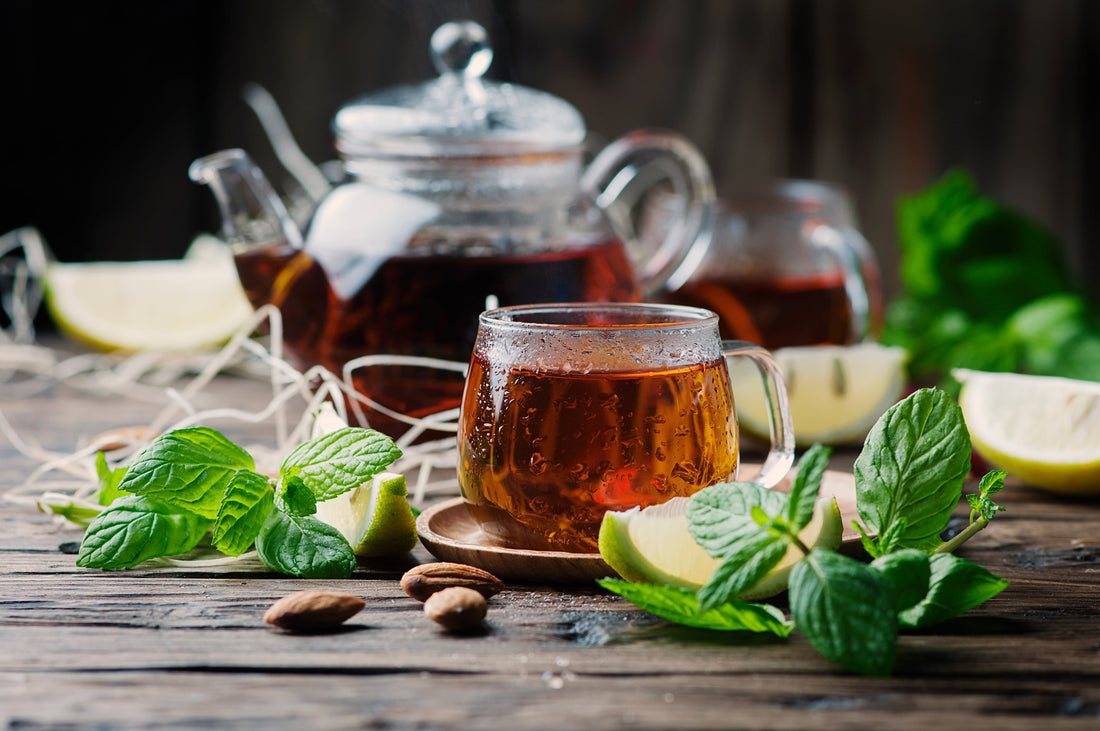What is L-theanine?
TL;DR: L-theanine is natural nootropic found in tea that can induce relaxation. In addition to a long list of benefits, L-theanine is a potential treatment for alcohol withdrawl. For the same reason that L-theanine may partially alleviate alcohol withdrawal symptoms, it can help those trying to moderate themselves better. In social settings, L-theanine mimicks the relaxing effects of alcohol and may satisfy that all-too-familiar urge to “have one more.”
If you’ve ever poured yourself a hot cup of black or green tea and noticed how great it made you feel, you’ve already experienced the tremendous benefits of L-theanine. Because it’s naturally found in tea, L-theanine (sometimes referred to as “theanine”) is the second most popular nootropic in the world behind caffeine.
More specifically, theanine is a non-protein amino acid known for its ability to immediately induce relaxation (immediate is important, and we’ll come back to this later). L-theanine reduces levels of cortisol, the stress hormone, and triggers a small release of pleasure chemicals like dopamine and serotonin to help us feel good.
L-theanine supplements have increased in popularity in recent years. People have learned that combining L-theanine and coffee can help settle jitters caused by caffeine. Others use it as a natural remedy for anxiety and lack of focus.
The list of benefits is long. Importantly, theanine is a safe supplement with very few side effects. But what about L-theanine and alcohol?
There’s been quite a bit of research on the interaction between L-theanine and alcohol, including L-theanine’s promise as a treatment for alcohol withdrawal symptoms.
Now, I know what you’re thinking: “I’m not an alcoholic; what does this have to do with me?” Bear with me.
For the same reason that L-theanine may partially alleviate alcohol withdrawal symptoms, it can help those trying to moderate themselves better. In social settings, L-theanine mimicks the relaxing effects of alcohol and may satisfy that all-too-familiar urge to “have one more.”
Thus, we can significantly reduce the number of alcoholic drinks we have when we’re partying without feeling like we’re missing out or losing our buzz. The implications are indeed life-changing!
The Science: How Alcohol & L-theanine Effect the Brain.
TL;DR: Alcohol & L-theanine trigger the same pysiological mechanisms in our brain to help us relax. Most important of these mechanisms, alcohol & theanine both influence our GABA receptors, helping us feel calm and relaxed - like the world is slowing to a "manageable" pace. If you've had a few alcoholic drinks before, you know the feeling.
One of the essential properties of L-theanine is that it can cross the “blood-brain barrier,” a natural shield that protects the brain from toxic substances. Supplements that cannot cross the blood-brain barrier typically have a weak efficacy profile. On the other hand, theanine can get to work almost immediately after consumption. Here’s what theanine and alcohol do to help us relax:
- The first way theanine helps us relax is by blocking glutamate receptors. L-theanine is similar in structure to a stress chemical in the brain called glutamate (which makes you panicked and jittery). Because it has a similar structure, L-theanine clogs up the brain’s receptors for glutamate, preventing actual glutamate from making us feel bad.
- L-theanine is also like L-glutamine, which serves as a building block for GABA. GABA is a neurotransmitter that dampens activity in the brain and causes a sensation of relaxation. So taking L-theanine increases the brain's supply of GABA, which feels great. If you’ve had an alcoholic drink or two and notice yourself relaxing and feeling like the world is slowing down to a manageable pace, this is the work of GABA. People who drink to relax are essentially drinking to activate their GABA receptors. Alcohol impersonates GABA, causes glutamate to plummet, and leads to that relaxed feeling we’ve all learned to enjoy. L-theanine causes a similar effect.
- Like alcohol, L-theanine boosts serotonin and dopamine levels. These “happy” chemicals are associated with feelings of confidence, relaxation, reward, motivation, and learning. One of the key reasons we often “accidentally” have too much to drink is because dopamine keeps telling us to “have one more.”
- Finally, L-theanine and alcohol both induce our brain to produce “alpha” brain waves associated with states of calm and relaxation.
You can begin to see why consuming L-theanine alongside alcohol can help us drink less without giving up the rewarding feelings we’re used to from alcohol.
We’ve found that alternating between alcoholic and non-alcoholic rounds with L-theanine makes us feel like we’re drinking. But, of course, we’re consuming far less alcohol, still having a great time, and waking up the next day feeling much better.
Other Positive Benefits of L-theanine.
TL;DR L-theanine may also alleviate hangover symptions, especially "hangiexty," which results from your brain overproducing glutamate, a chemical that causes anxiety and jitters.
If L-theanine’s ability to trick us into drinking less isn’t enough, there are a host of other positive benefits from supplementing L-theanine:
- L-theanine may prevent alcoholic liver injury by enhancing antioxidant capability of liver cells. (source, source)
- Alcohol use can increase the number of glutamate receptors (stress/ jitters receptors), which amino acids like L-theanine can fill to help prevent withdrawal symptoms (i.e., “hangxiety”). (source)
- In addition to its well-established relaxing effects, L-theanine has antipsychotic and antidepressant effects. (source)
- L-theanine crosses the blood-brain barrier and exerts various effects, including increasing GABA activity, modulatingserotonin and dopamine, increasing brain-derived neurotrophic factor (BDNF), and increasing cognitive performance through its actions on NMDA receptors. (source)
- Eight weeks of L-theanine administration to depressed patients produced multiple beneficial effects on depressive symptoms, anxiety, sleep disturbances, and cognitive impairments. (source)
- A study in mice found that L-theanine exerts a neuroprotective effect mediated by GABA-A receptors. (source)
- L-theanine can help with nicotine withdrawal bysignificantly inhibiting the rewarding effects of nicotine. (source)
Does L-theanine Have Side Effects?
TL;DR Theanine is generally recognized as safe by the FDA. A small majority may experience headaches or trouble sleeping. At larger doses, some complain of nausea and dizziness.
Now that we’ve talked about all the good, what about potentia side effects? The US Food & Drug Administration has labeled branded L-theanine supplements as “GRAS,” which is generally recognized as safe.
A GRAS ingredient has undergone safety evaluations by experts and has been proven not to cause harm when used as intended. Once experts agree that it does not cause damage when used as intended, it’s added to the GRAS ingredient list.
However, since L-theanine is not a drug, there is not an official side effect list, so we must rely on anecdotal reporting.
A small number of users report headaches or difficulty sleeping. Even rarer nausea, stomach aches, and dizziness are reported in higher doses. It’s important to note that most of these reports include the use of L-theanine and caffeine together.
How Much L-theanine is Enough?
There isn’t an official side effect profile for L-theanine for the same reasons there aren’t definitive dosing guidelines. However, we know that the clinical studies listed above used 100-300 mg per day doses. As with any supplement, most herbal medicine experts suggest starting on the low end of things and gradually increasing as needed or desired. If you’re consuming L-theanine alongside alcohol, our strong recommendation would be to follow similar advice: start low, see how you feel, then adjust as needed.
For reference, a cup of tea has about 30-50 mg of L-theanine, so 300mg would be about 10x as much as you can get naturally.
A Final Word
This article is for people without alcohol use disorder. Alcohol use and its associated problems exist on a spectrum. Only adoctor can say for sure if your alcohol consumption habits or patterns meet the criteria for alcohol use disorder. If you can associate drinking with a complete loss of control, I recommend you seek the advice of a medical professional.
Lastly, we believe that alcohol plays too extreme a role in our social norms. Alcohol can be great when enjoyed in moderation. We want to invite folks to explore ways to make moderation more enjoyable so we can all liberate ourselves from hangovers and get ahead in our lives!

